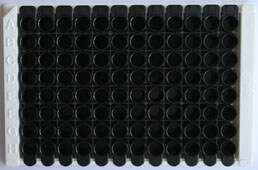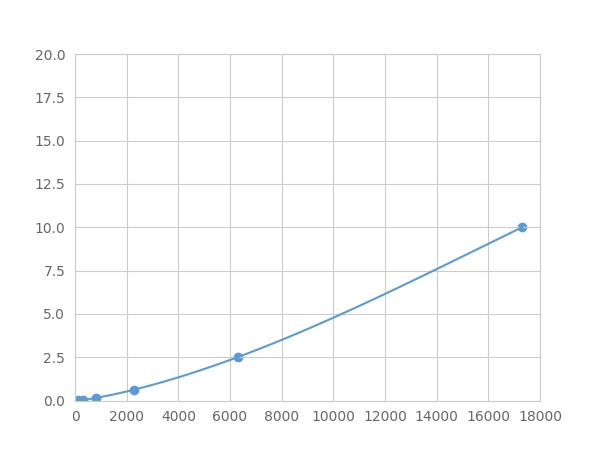Packages (Simulation)

Reagent Preparation

Image (I)
Image (II)
Certificate


Multiplex Assay Kit for Prolactin (PRL) ,etc. by FLIA (Flow Luminescence Immunoassay)
LTH; Luteotropic Hormone
(Note: Up to 8-plex in one testing reaction)
- Product No.LMA846Po
- Organism SpeciesSus scrofa; Porcine (Pig) Same name, Different species.
- Sample TypeSerum, plasma and other biological fluids
- Test MethodDouble-antibody Sandwich
- Assay Length3.5h
- Detection Range0.01-10ng/mL
- SensitivityThe minimum detectable dose of this kit is typically less than 0.003 ng/mL.
- DownloadInstruction Manual
- UOM 8Plex 7Plex 6Plex 5Plex 4Plex 3Plex 2Plex1Plex
- FOB
US$ 472
US$ 490
US$ 517
US$ 553
US$ 590
US$ 644
US$ 726
US$ 907
Add to Price Calculator
Result
For more details, please contact local distributors!
Specificity
This assay has high sensitivity and excellent specificity for detection of Prolactin (PRL) ,etc. by FLIA (Flow Luminescence Immunoassay).
No significant cross-reactivity or interference between Prolactin (PRL) ,etc. by FLIA (Flow Luminescence Immunoassay) and analogues was observed.
Recovery
Matrices listed below were spiked with certain level of recombinant Prolactin (PRL) ,etc. by FLIA (Flow Luminescence Immunoassay) and the recovery rates were calculated by comparing the measured value to the expected amount of Prolactin (PRL) ,etc. by FLIA (Flow Luminescence Immunoassay) in samples.
| Matrix | Recovery range (%) | Average(%) |
| serum(n=5) | 89-103 | 99 |
| EDTA plasma(n=5) | 90-99 | 93 |
| heparin plasma(n=5) | 78-99 | 89 |
| sodium citrate plasma(n=5) | 87-101 | 90 |
Precision
Intra-assay Precision (Precision within an assay): 3 samples with low, middle and high level Prolactin (PRL) ,etc. by FLIA (Flow Luminescence Immunoassay) were tested 20 times on one plate, respectively.
Inter-assay Precision (Precision between assays): 3 samples with low, middle and high level Prolactin (PRL) ,etc. by FLIA (Flow Luminescence Immunoassay) were tested on 3 different plates, 8 replicates in each plate.
CV(%) = SD/meanX100
Intra-Assay: CV<10%
Inter-Assay: CV<12%
Linearity
The linearity of the kit was assayed by testing samples spiked with appropriate concentration of Prolactin (PRL) ,etc. by FLIA (Flow Luminescence Immunoassay) and their serial dilutions. The results were demonstrated by the percentage of calculated concentration to the expected.
| Sample | 1:2 | 1:4 | 1:8 | 1:16 |
| serum(n=5) | 88-104% | 79-94% | 89-103% | 80-103% |
| EDTA plasma(n=5) | 83-91% | 80-102% | 82-104% | 97-105% |
| heparin plasma(n=5) | 99-105% | 93-102% | 89-97% | 89-99% |
| sodium citrate plasma(n=5) | 89-104% | 83-102% | 86-101% | 80-95% |
Stability
The stability of kit is determined by the loss rate of activity. The loss rate of this kit is less than 5% within the expiration date under appropriate storage condition.
To minimize extra influence on the performance, operation procedures and lab conditions, especially room temperature, air humidity, incubator temperature should be strictly controlled. It is also strongly suggested that the whole assay is performed by the same operator from the beginning to the end.
Reagents and materials provided
| Reagents | Quantity | Reagents | Quantity |
| 96-well plate | 1 | Plate sealer for 96 wells | 4 |
| Pre-Mixed Standard | 2 | Standard Diluent | 1×20mL |
| Pre-Mixed Magnetic beads (22#:PRL) | 1 | Analysis buffer | 1×20mL |
| Pre-Mixed Detection Reagent A | 1×120μL | Assay Diluent A | 1×12mL |
| Detection Reagent B (PE-SA) | 1×120μL | Assay Diluent B | 1×12mL |
| Sheath Fluid | 1×10mL | Wash Buffer (30 × concentrate) | 1×20mL |
| Instruction manual | 1 |
Assay procedure summary
1. Preparation of standards, reagents and samples before the experiment;
2. Add 100μL standard or sample to each well,
add 10μL magnetic beads, and incubate 90min at 37°C on shaker;
3. Remove liquid on magnetic frame, add 100μL prepared Detection Reagent A. Incubate 60min at 37°C on shaker;
4. Wash plate on magnetic frame for three times;
5. Add 100μL prepared Detection Reagent B, and incubate 30 min at 37°C on shaker;
6. Wash plate on magnetic frame for three times;
7. Add 100μL sheath solution, swirl for 2 minutes, read on the machine.
GIVEAWAYS
INCREMENT SERVICES
| Magazine | Citations |
| The Journal of Biological Chemistry | In Vivo Evidence for Epidermal Growth Factor Receptor (EGFR)-mediated Release of Prolactin from the Pituitary Gland Jcb: 39297 |
| Journal of Clinical Neuroscience | TLR9 expression is associated with prognosis in patients with glioblastoma multiforme ScienceDirect: S0967586811003572 |
| Sensors and Actuators B: Chemical | Determination of prolactin hormone in serum and urine using an electrochemical immunosensor based on poly(pyrrolepropionic acid)/carbon nanotubes hybrid modified electrodes Sciencedirect:S0925400514000720 |
| Veterinary Word | Effect of extended photoperiod during winter on growth and onset of puberty in Murrah buffalo heifers Pubmed:27051212 |
| Journal of Dairy Science | Effect of thermal stress on physiological, hormonal and haematological parameters in Tharparkar and Karan Fries calves publication:306322503 |
| Stem Cell Research & Therapy | Differentiation of human umbilical cord Wharton’s jelly-derived mesenchymal stem cells into endometrial cells pubmed:29096715 |
| Stem Cell Research & Therapy | The role of mesenchymal stem cells in chemotherapy-induced gonadotoxicity Pubmed:30021657 |
| Frontiers in Molecular Neuroscience | Impact of Triclosan on Female Reproduction through Reducing Thyroid Hormones to Suppress Hypothalamic Kisspeptin Neurons in Mice Pubmed:29403355 |
| Toxicology and Applied Pharmacology | The antipsychotics sulpiride induces fatty liver in rats via phosphorylation of insulin receptor substrate-1 at Serine 307-mediated adipose tissue insulin resistance Pubmed:29551354 |
| Journal of Cellular Biochemistry | The prolactin‐release inhibitor paeoniflorin suppresses proliferation and induces apoptosis in prolactinoma cells via the mitochondria‐dependent pathway Pubmed:29388711 |
| Journal of Cellular and Molecular Medicine | Metformin inhibits growth and prolactin secretion of pituitary prolactinoma cells and xenografts Pubmed: 30334324 |
| BMC Veterinary Research | Hormonal and metabolic indicators before and after farrowing in sows affected with postpartum dysgalactia syndrome Pubmed: 30404636 |
| International Journal of Basic and Clinical Endocrinology | Expression of prolactin receptors in the duodenum, kidneys and skeletal system during physiological and sulpiride-induced hyperprolactinaemia Pubmed: 30143940 |
| MORPHOLOGY AND PATHOMORPHOLOGY | Morphological and Biochemical Characteristics of Prostate Hyperplasia during Sulpiride Treatment Pubmed: 32152847 |
| JOURNAL OF DAIRY SCIENCE | Effect of heat stress during the early and late dry period on mammary gland development of Holstein dairy cattle Pubmed: 32684470 |
| BioMed Research International | Pathophysiological Changes in Female Rats with Estrous Cycle Disorder Induced by Long-Term Heat Stress Pubmed: 32685488 |
| Vet Microbiol | Prolactin affects the disappearance of ALV-J viremia in vivo and inhibits viral infection 34391195 |
| Antioxidants (Basel) | Effects of a Nanoencapsulated Moringa Leaf Ethanolic Extract on the Physiology, Metabolism and Reproductive Performance of Rabbit Does during Summer 34439574 |
| Nutrients | Yogurt Enriched with Inulin Ameliorated Reproductive Functions and Regulated Gut Microbiota in Dehydroepiandrosterone-Induced Polycystic Ovary Syndrome Mice Pubmed:35057459 |
| Catalog No. | Related products for research use of Sus scrofa; Porcine (Pig) Organism species | Applications (RESEARCH USE ONLY!) |
| APA846Po01 | Active Prolactin (PRL) | Cell culture; Activity Assays. |
| RPA846Po01 | Recombinant Prolactin (PRL) | Positive Control; Immunogen; SDS-PAGE; WB. |
| PAA846Po01 | Polyclonal Antibody to Prolactin (PRL) | WB; IHC; ICC; IP. |
| MAA846Po21 | Monoclonal Antibody to Prolactin (PRL) | WB; IHC; ICC; IP. |
| SEA846Po | ELISA Kit for Prolactin (PRL) | Enzyme-linked immunosorbent assay for Antigen Detection. |
| HEA846Po | High Sensitive ELISA Kit for Prolactin (PRL) | Enzyme-linked immunosorbent assay for Antigen Detection. |
| LMA846Po | Multiplex Assay Kit for Prolactin (PRL) ,etc. by FLIA (Flow Luminescence Immunoassay) | FLIA Kit for Antigen Detection. |





